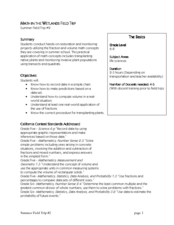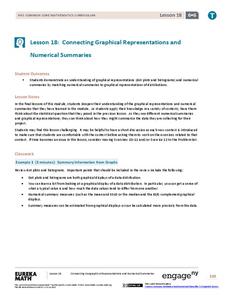Curated OER
Math in the Wetlands Field Trip
Get your class out in the environment for hands on math activities. In this wetlands lesson, learners transplant native plants, calculate how much soil is needed, and perform math activities based on this experience. They then make...
EngageNY
Multiplying and Dividing Expressions with Radicals
That's radical! Simplifying radicals may not be exciting, but it is an important skill. A math lesson provides explanations of properties used throughout the material. Scholars practice skills needed to multiply and divide...
Mathematics Assessment Project
Generalizing Patterns: Table Tiles
As part of a study of geometric patterns, scholars complete an assessment task determining the number of tiles needed to cover a tabletop. They then evaluate provided sample responses to see different ways to solve the same...
Statistics Education Web
You Will Soon Analyze Categorical Data (Classifying Fortune Cookie Fortunes)
Would you rely on a fortune cookie for advice? The lesson plan first requires future statisticians to categorize 100 fortune cookie fortunes into four types: prophecy, advice, wisdom, and misc. The lesson plan goes on to have learners...
Curated OER
Find 1
Extend your class's ability to represent unit fractions on a number line with this challenging worksheet. Given two number lines, one labeled with zero and 1/4, the other with zero and 5/3, learners must accurately locate the number one...
Curated OER
Let Us Be Sensible
Students describe the five senses. They perform an investigation using sensory organs associated with each of the senses. Students identify, describe and extend repeating relationship (pattern) found in common, objects, sounds and...
MARS - Mathematics Assessment Resource Service
Applying Properties of Exponents
The properties of exponents are all linked together and it is your mathematicians' job to discover and apply those rules. The comprehensive lesson begins with a pre-assessment task to check for prior knowledge and then goes into a...
EngageNY
Connecting Graphical Representations and Numerical Summaries
Which graph belongs to which summary statistics? Class members build upon their knowledge of data displays and numerical summaries to connect the two. Pupils make connections between different graphical displays of the same data in...
Ohio Department of Education
Describing and Creating Plane Figures - Grade One
Young mathematicians draw, create, and describe different shapes using triangles. They discuss attributes of the original and created shapes. Pupils classify the created shapes and draw and write in mathematics journals to communicate...
Curated OER
Can You Guess The Flavor?
Second graders conduct a tasting experiment. In this senses instructional activity, 2nd graders read The Five Senses and brainstorm different tastes. They work in pairs, one blindfolded and the other recording. The blindfolded student...
Curated OER
What is it? Sally Smells!
Pupils explore the attributes of the human nose. In this 5 senses instructional activity, students participate in a smell guessing game prior to discussing the anatomy of the nose and creating a sense of smell book page.
EngageNY
Percent of a Quantity
Visualize methods of finding percents. Classmates find a percent of a quantity using two methods including a visual model in the 26th lesson in a series of 29. By the end of the lesson, scholars find percents given a part and the whole...
EngageNY
Writing and Interpreting Inequality Statements Involving Rational Numbers
Statements often have multiple interpretations — but not these inequality statements. Scholars compare rational numbers and write inequality statements symbolically. The lesson includes problems that require comparing three numbers.
EngageNY
Exploiting the Connection to Trigonometry 2
The class checks to see if the formula for finding powers of a complex number works to find the roots too. Pupils review the previous day's work and graph on the polar grid. The discussion leads the class to think about...
Statistics Education Web
How High Can You Jump?
How high can your pupils jump? Learners design an experiment to answer this question. After collecting the data, they create box plots and scatter plots to analyze the data. To finish the lesson plan, they use the data to...
American Statistical Association
Bubble Trouble!
Which fluids make the best bubbles? Pupils experiment with multiple fluids to determine which allows for the largest bubbles before popping. They gather data, analyze it in multiple ways, and answer analysis questions proving they...
Statistics Education Web
It’s Elemental! Sampling from the Periodic Table
How random is random? Demonstrate the different random sampling methods using a hands-on activity. Pupils use various sampling techniques to choose a random sample of elements from the periodic table. They use the different samples to...
Curated OER
Number Sense and Numeration
Students add and subtract integers. In this algebra lesson plan, students discuss number sense as they sort numbers in the correct order. They analyze and label numbers differentiating between rational and irrational numbers.
Curated OER
Math Series
Even though this activity is just a simple review of estimation, it is a fast and easy way to explore this topic. Young mathematicians estimate the number of items contained in two jars and discuss their answers. Afterwards, they can use...
Curated OER
Counting Zero to Five
Students are introduced to the numerals zero through five. They associate the numeral with the correct number of objects. Students comprehend the quantities zero through five showing "How many?" by counting their fingers or using a...
Curated OER
Building Numbers to 5
Students compose groups of items up to the number 5. In this number 5 lesson plan, students also connect names to numbers, record sizes of groups, and compose and decompose groups.
Curated OER
Marshmallow Fun Day - math
Early learners rotate to different classroom centers and participate in six activities based on using marshmallows to review concepts learned. They make: marshmallow sculptures (geometric shapes), the shape of mittens using colored...
EngageNY
Creating Division Stories
Create your own adventure story ... well, not really. The fifth lesson in a 21-part series has pairs create story contexts for division problems. The lesson presents a step-by-step process for pupils to follow in writing such stories.
EngageNY
The Long Division Algorithm
Two methods are always better than one! The eighth installment in this series asks pupils to convert decimals to fractions using two approaches. Individuals first use the more traditional approach of long division and then use reverse...























